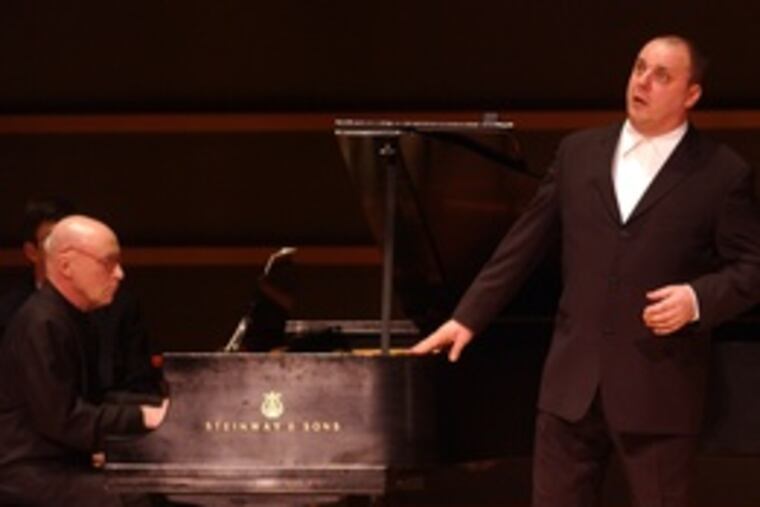In the moment with Goerne, Eschenbach
NEW YORK - If there's ever a Renée Fleming Congeniality Award, German baritone Matthias Goerne is not likely to be nominated, even by the full Carnegie Hall audience that repeatedly cheered him and Christoph Eschenbach (in a rare outing as an art-song accompanist) on Monday.

NEW YORK - If there's ever a Renée Fleming Congeniality Award, German baritone Matthias Goerne is not likely to be nominated, even by the full Carnegie Hall audience that repeatedly cheered him and Christoph Eschenbach (in a rare outing as an art-song accompanist) on Monday.
Everything about the presentation was grave and austere, and with an artistry easily on a level with the greatest vocal recitalists of the last century. The repertoire was all seldom-heard, non-masterpiece Schumann and Brahms (to be repeated Monday at the Kimmel Center) that wasn't easy, but it had a purpose, not easily explained, beyond rescuing repertoire from obscurity. And explanations are warranted: With Goerne's Philadelphia Orchestra engagements Thursday through Saturday, plus his recital, Philadelphia is about to see a lot of him.
The Weimar-born Goerne, 40, studied with Dietrich Fischer-Dieskau and Elisabeth Schwarzkopf, but is more than a well-trained artistic descendant. His opera repertoire is scary: the title roles in Berg's Wozzeck and Reimann's Lear. When he sings Schubert with the Philadelphia Orchestra starting tonight, some orchestrations are by Webern.
No matter what he sings, he seems possessed - a quality most apparent amid the flexibility of recitals. They also allow listeners to enjoy larger doses of his voice, which has abundant warmth but, in contrast to Fischer-Dieskau's laser precision, a slight wooliness that opens the door to poetic ambiguity. (It also sounds richer from a distance, at least in Carnegie Hall.)
Unlike his great teachers, Goerne is never caught in contrivance. Some recitalists cultivate a kind of artifice that makes them musical tour guides. With no division between the song and himself, Goerne uses the repertoire's unfamiliarity (even when of lesser quality, like Brahms' Lieder und Gesange Op. 32) as an aid for drawing listeners out of their personal point of reference and into his moment.
During Schumann's Liederkreis (Op. 24, not the beloved Op. 39 Liederkreis), I attempted comparisons with Eschenbach's recording with Peter Schreier: The piece was recognizable but the experience with Goerne - who emphasizes the existential horror of living - was completely new.
Though a handsome man, he hardly presented himself as such on Monday in an ill-fitting gray suit, white open-neck shirt, and patchy few days' growth of beard. In a Princeton recital in 2001, he was dressed in black, head shaved, and he barely moved, concentrating solely on what came out of his mouth. Now, his sizable self moves constantly, swaying and spending much time on tiptoe, peering at something beyond his reach while also addressing the audience in less-expensive seats.
That physicality is guided not by the content of the words but by the music's contour. This is important: The weight of the world in Brahms' Vier ernste Gesange (Op. 121) arrived in higher relief because Goerne was so musically buoyant - aided greatly by Eschenbach, who once accompanied Fischer-Dieskau, and whose trademark concision and X-ray phrasing were much in evidence.
Some listeners may resent what Goerne puts them through - fun, it's not. And he doesn't allow the detachment that comes with gauging a talent by what you already know, like sports fans enjoying a home run because they know the statistics behind it. Consider, though, that in our information-laden age, in which performers and listeners have one foot in the past (and often know it as well as those who lived it), being jolted into the present startles, if only because it's so unfamiliar.